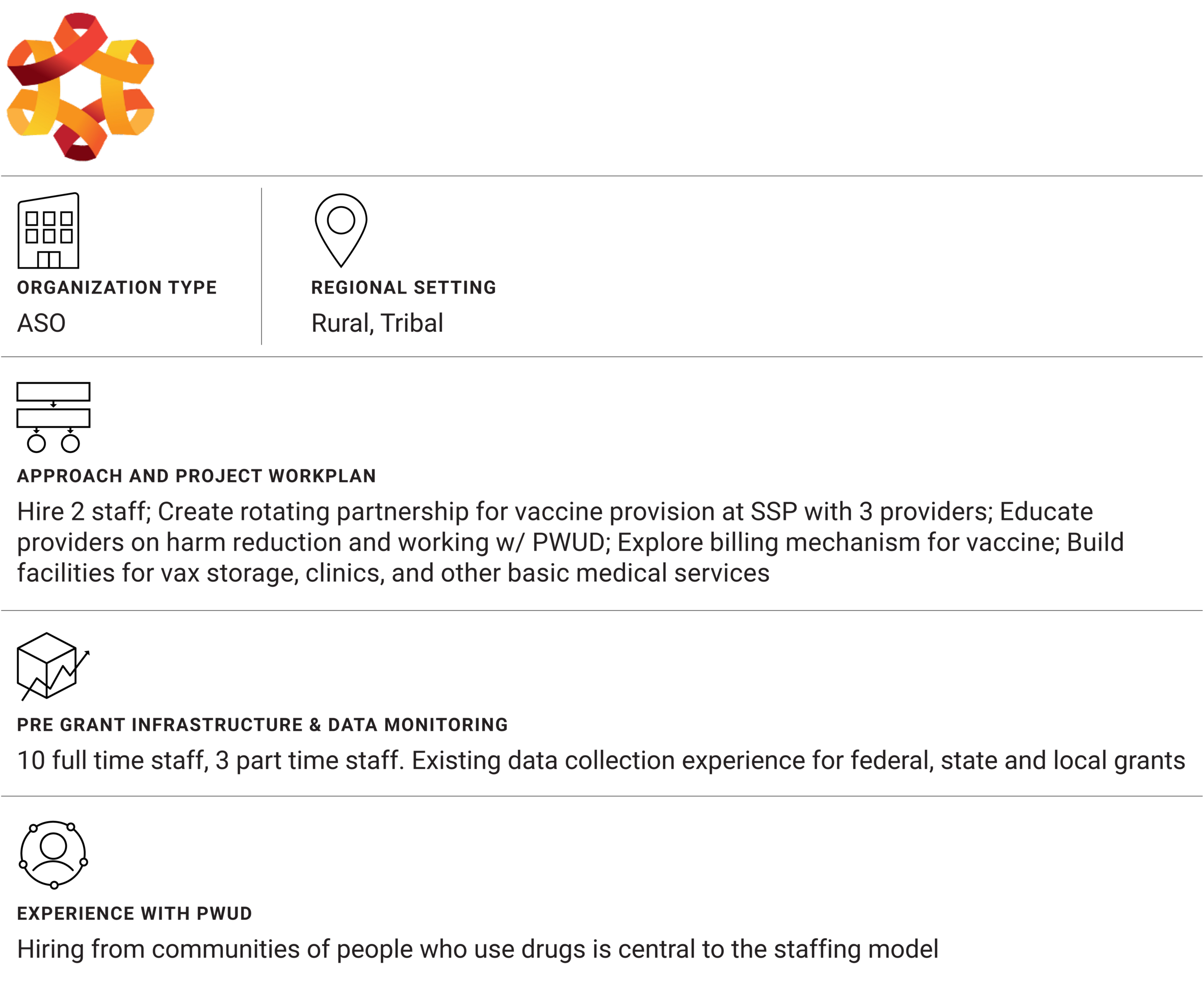
Open AID Alliance
Overview
Open Aid Alliance works with the unique potential of each individual to overcome stigma as they seek greater health. During this project, they partnered with the Missoula County Health Department to conduct a series of vaccine clinics. These vaccine clinics allowed program participants the ability to receive COVID-19, hep A and B, mpox vaccine, and vaccine education. Staff identified and addressed vaccine hesitancy concerns through participant interviews; with this information, it is vital to tailor Open AID Alliance’s future vaccine education and outreach efforts to address these concerns and promote vaccination in their community.
Creative Approaches
Peer Vaccine Ambassador:
Open Aid Alliance used some of this funding to hire a peer vaccine ambassador to serve as a point of contact for participants and a liaison for their organization. This individual’s primary role was to engage with clients, discuss the COVID-19 vaccine, educate them on its importance and benefits, and navigate them to vaccination services. As a peer with lived experience, the vaccine ambassador was uniquely positioned to build trust and rapport with program participants and to address any concerns or skepticism they may have about the vaccine. By providing accurate information and resources, the ambassador played a crucial role in increasing vaccination rates within the community and played a key role in helping Open AID Alliance understand and address the unique needs and concerns of their participant pool.
Natural Medicines
In addition to providing sterile needles, education on safe injection practices, and referrals to addiction treatment resources and adult vaccination services, Open AID Alliance also has a nurse on staff who incorporates natural and herbal medicines into their care approach. This holistic approach recognizes the cultural and physical value of alternative healing methods and strives to support participants in their journey toward better health and well-being. These natural medicines help to alleviate any participants’ feelings of mistrust of traditional medicines. Through the integration of natural and traditional medicine practices, Open AID Alliance is able to offer a unique and comprehensive approach to harm reduction that addresses the diverse and unique needs of its participants.
All-Terrain Outreach
Open Aid Alliance remained dedicated to reaching out to unhoused individuals living in single tents in tough-to-reach terrains. Their outreach efforts extend to those who are so far off-road that they can only be accessed by foot or bike. Despite the challenges of navigating through remote areas, the team at Open Aid Alliance is committed to providing vital services such as sterile syringes, harm reduction education, and referrals to healthcare and social services to those in need and has begun backpacking with materials to connect with remote participants. By going above and beyond to reach underserved populations, Open Aid Alliance is reinforcing its mission and is making a positive impact on the lives of individuals who may otherwise lack access to critical health resources.
Understanding participant vaccine hesitancy
Open Aid Alliance developed a comprehensive COVID interview to assess participants’ current knowledge of COVID, COVID vaccines, as well as their sources of information. Participants were incentivized to participate in these interviews with a $10 gift card, which helped drive engagement and participation. The interview collected data on participants’ willingness to get vaccinated immediately and where they typically receive their healthcare services and information. Based on the information gathered, OAA staff could tailor a personalized message to meet participants at their respective stages of contemplation.
This initiative not only helped in addressing the gaps in knowledge about the virus but also encouraged participants to make informed decisions about their personal and community health.
Crafting new hiring and retention processes
Open Aid Alliance implemented an inclusive hiring process for their syringe exchange program, with the aim of prioritizing people who use drugs. They developed a unique set of interview questions that encouraged self-reflection, fostered a deeper understanding of personal skills rather than professional background, and focused on lived experience. Additionally, they made an important change by removing the term “peer” from the job title, enabling individuals to aspire to growth and advancement without limitation. Once candidates were hired, OAA crafted an onboarding/training process that works to build on the strengths of the employee and is done so intentionally to increase staff retention. During the project, OAA identified and trained a new Executive Director, Rebecca Ramos. With the support and guidance of the previous Executive Director, Christa Weathers, the transition was seamless and did not interrupt programming. Rebecca’s extensive experience in public health and community outreach has already proven to be an invaluable asset to the organization.
Challenges
Encampment Displacement
Conducting outreach to unsheltered populations has become increasingly challenging for Open Aid Alliance due to the dispersal of encampments. As these encampments are broken up and individuals are forced to find alternative locations, locating and reaching out to participants has become a daunting task. Many have relocated to extremely remote areas, making it difficult for outreach workers to access them and provide the necessary support. This dispersal has also heightened the potential for overdose and medical challenges, as individuals are further removed from essential resources and services. Overcoming these obstacles has become crucial in ensuring the continued health and well-being of the unsheltered population. “Pre COVID unsheltered about 30% after COVID it has risen to about 80%”.
Hiring and retaining PWUD’s as “Peer Vaccine Ambassadors”:
Open AID Alliance’s peer Ambassador Program faced a significant challenge when the first person hired for the role was unvaccinated and lacked the ability to engage in impactful conversations about vaccination. This hindered their effectiveness in promoting vaccination among people who use drugs. Additionally, the individual had difficulties adhering to their schedule and retaining their position as a peer ambassador. Consequently, the program had to adapt and hire a different person, leading to the creation of a new hiring process. This revised approach prioritized equity for PWUD, ensuring that future ambassadors were not only knowledgeable about harm reduction but also capable of effectively advocating for important health measures like vaccination.
Vaccine infrastructure:
Open Aid Alliance faced a challenge in becoming COVID vaccination provider due to the impact it had on their liability insurance. Despite the organization's ability to acquire access to a variety of vaccines and their dedication to providing equitable access to healthcare services, insurance providers were hesitant to cover the program's expanded services. Increases in Liability insurance costs are particularly challenging in Western, rural, and non-Medicaid expansion states, where access to healthcare services may be more limited. In these cases, the addition of vaccine services could expose the organization to a higher level of risk and potential liability and subsequent Liability insurance costs. This presented a significant obstacle for Open Aid Alliance, as they were eager to support the vaccination efforts in their community and play a crucial role in ending the pandemic. Despite the setback, the organization remained resilient and continued to advocate for their ability to provide essential healthcare services. The aforementioned vaccine clinics held in partnership with the county health department was a valuable initiative to help mitigate the effects of this challenge and continue to provide access to vaccination services for their participants.
Total Monthly Data
|
Service |
Number of Encounters |
|
Received education on COVID and COVID vaccination |
195 |
|
Referred to COVID vaccination |
79 |
|
COVID-19 Vaccination (on-site) |
16 |
|
COVID-19 Vaccination (off-site) |
0 |
| Monkeypox vaccinations | 11 |
| Other vaccinations | 7 |
| Total encounters | 3837 |
